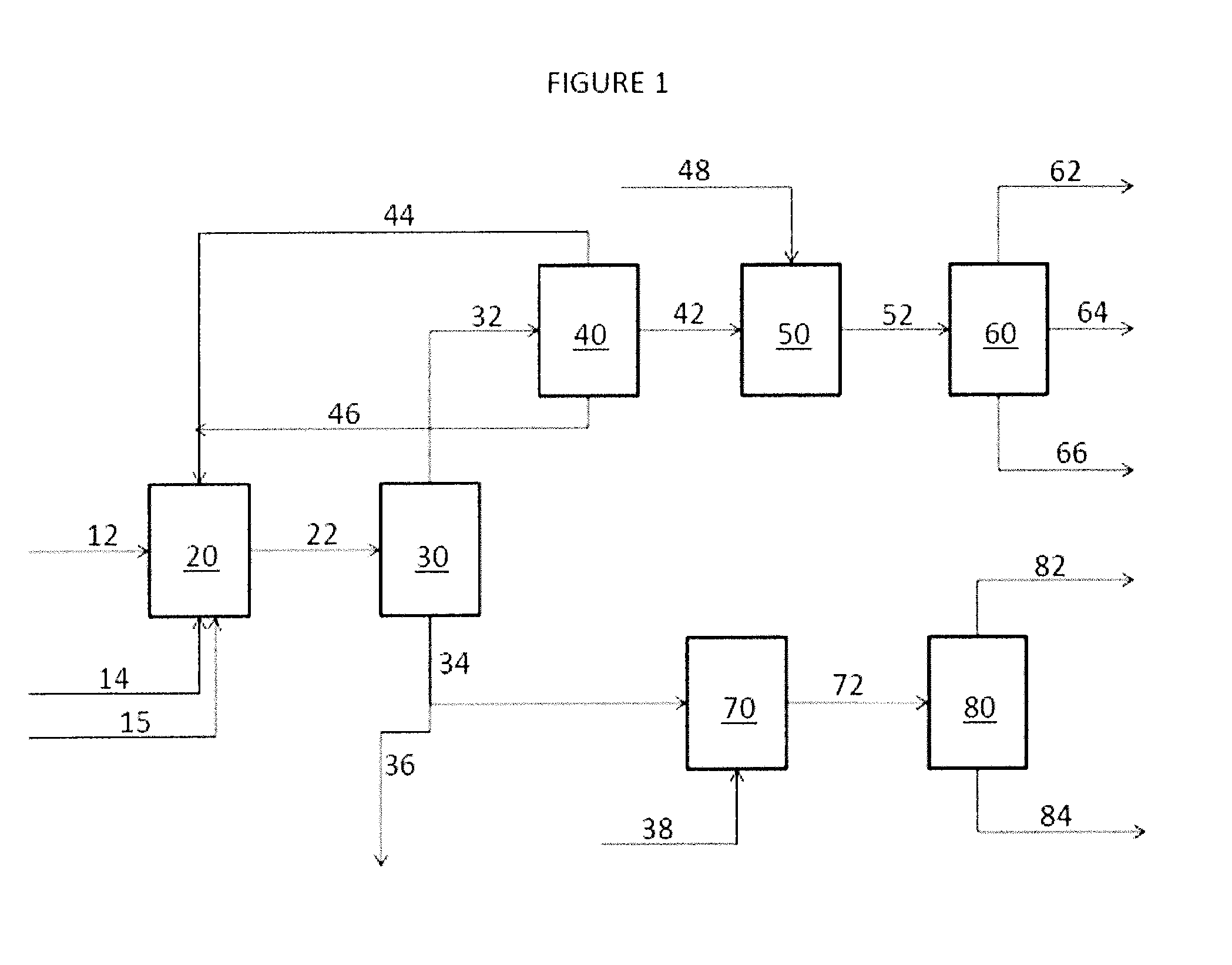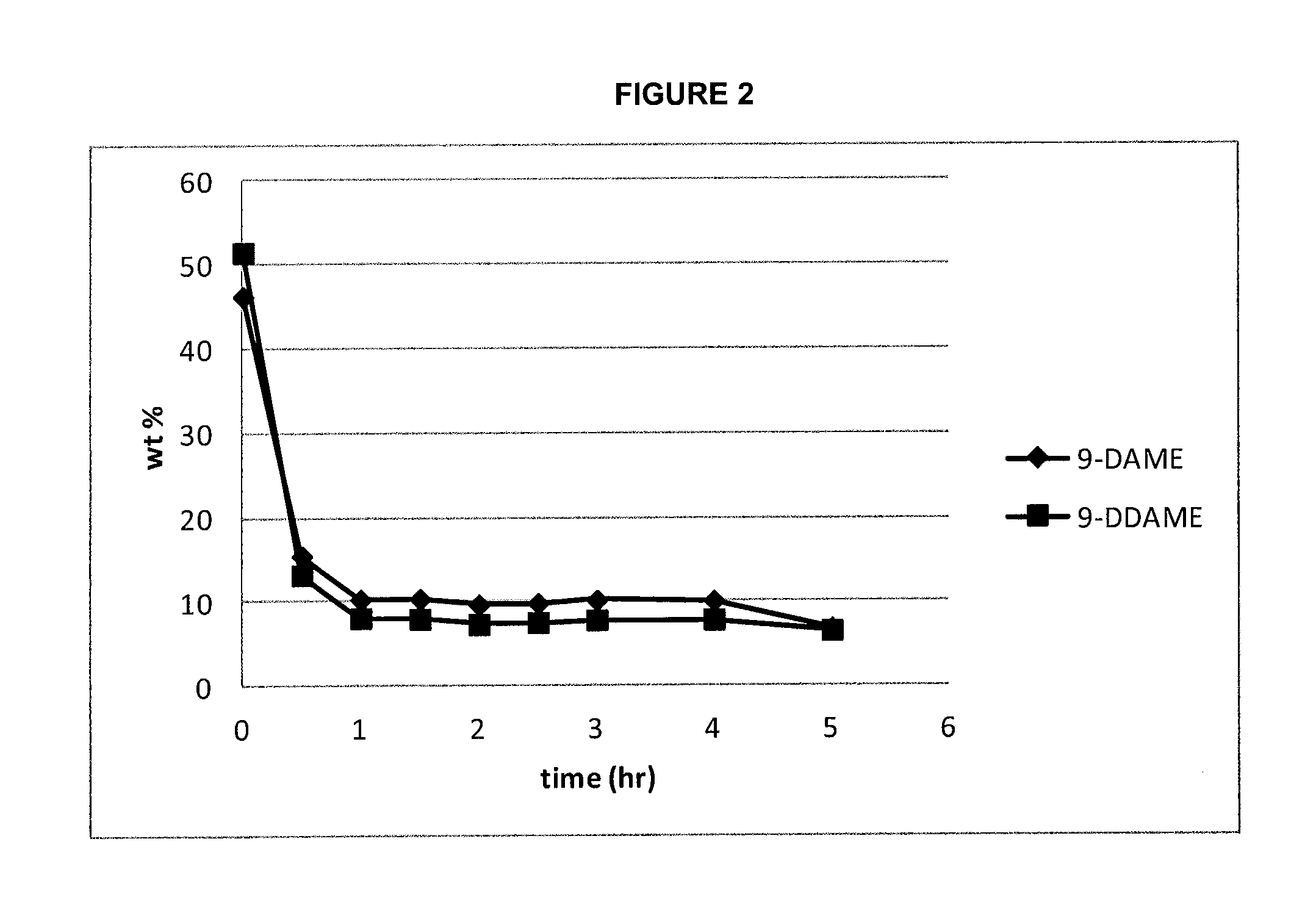Methods of refining and producing dibasic esters and acids from natural oil feedstocks
- Summary
- Abstract
- Description
- Claims
- Application Information
AI Technical Summary
Benefits of technology
Problems solved by technology
Method used
Image
Examples
example 1
[0146]A clean, dry, stainless steel jacketed 5-gal. Parr reactor vessel equipped with a dip tube, overhead stirrer, internal cooling / heated coils, temperature probe, sampling valve, and headspace gas release valve was purged with argon to 15 psig. Soybean oil (SBO, 2.5 kg, 2.9 mol, Costco, MWn=864.4 g / mol, 85 weight % unsaturation as determined by gas chromatographic analysis (“by gc”), 1 hour argon sparged in 5-gal container) was added into the Parr reactor. The Parr reactor was sealed and the SBO was purged with argon for 2 hours while cooling to 10° C. After 2 hours, the reactor was vented until the internal pressure reached 10 psig. The dip tube valve on the reactor was connected to a 1-butene cylinder (Airgas, CP grade, 33 psig headspace pressure, >99 weight %) and re-pressurized to 15 psig of 1-butene. The reactor was vented again to 10 psig to remove residual argon in the headspace. The SBO was stirred at 350 rpm and 9-15° C. under 18-28 psig 1-butene until 3 mol 1-butene per...
example 2
[0147]By the general procedures described in example 1, a reaction was performed using 1.73 kg SBO and 3 mol 1-butene / SBO double bond. An aliquot of the product mixture was found by gas chromatographic analysis following transesterification with 1% w / w NaOMe in methanol at 60° C. to contain approximately 24 weight % methyl 9-decenoate, approximately 18 weight % methyl 9-dodecenoate, approximately 2 weight % dimethyl 9-octadecenedioate, and approximately 2 weight % methyl 9-octadecenoate (as determined by gc).
example 3
[0148]By the general procedures described in example 1, a reaction was performed using 1.75 kg SBO and 3 mol 1-butene / SBO double bond. An aliquot of the product mixture was found by gas chromatographic analysis following transesterification with 1% w / w NaOMe in methanol at 60° C. to contain approximately 24 weight % methyl 9-decenoate, approximately 17 weight % methyl 9-dodecenoate, approximately 3 weight % dimethyl 9-octadecenedioate, and approximately 2 weight % methyl 9-octadecenoate (as determined by gc).
PUM
| Property | Measurement | Unit |
|---|---|---|
| Fraction | aaaaa | aaaaa |
| Weight | aaaaa | aaaaa |
| Weight ratio | aaaaa | aaaaa |
Abstract
Description
Claims
Application Information
 Login to View More
Login to View More - R&D
- Intellectual Property
- Life Sciences
- Materials
- Tech Scout
- Unparalleled Data Quality
- Higher Quality Content
- 60% Fewer Hallucinations
Browse by: Latest US Patents, China's latest patents, Technical Efficacy Thesaurus, Application Domain, Technology Topic, Popular Technical Reports.
© 2025 PatSnap. All rights reserved.Legal|Privacy policy|Modern Slavery Act Transparency Statement|Sitemap|About US| Contact US: help@patsnap.com



